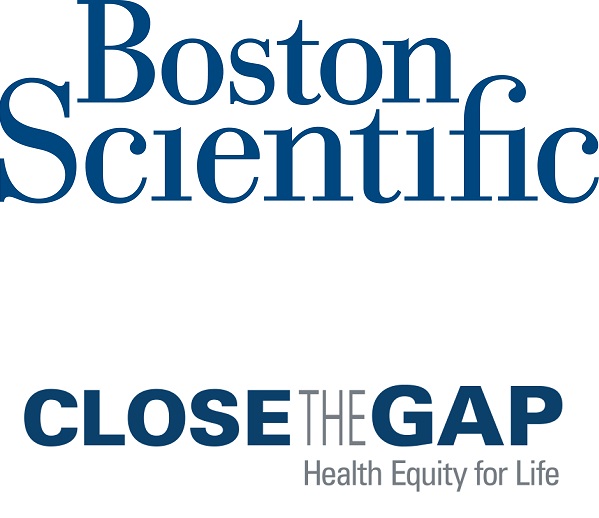Boston Scientific tackles widespread disparities in healthcare with its Close the Gap program
Published 08-12-14
Submitted by Boston College Center for Corporate Citizenship

In America, heart disease [1] is the #1 killer, taking more lives each year than all cancers combined. And although disease prevalence is similar across genders and ethnicities, awareness of risk factors and disparity in treatment rates are not. Close the Gap, a Boston Scientific educational initiative, was established in 2006 to address disparities in cardiovascular care for the underserved patient populations of women, African Americans, and Hispanic/Latino Americans. Initially focused solely on cardiovascular health, Close the Gap recently expanded its mission to address healthcare disparities that exist in other disease states, including asthma, colon cancer and pancreatic cancer.[2-5]
As a developer and manufacturer of innovative medical devices, Boston Scientific is dedicated to transforming lives and improving the health of patients around the world. “We care about the patient journey. And we want to do our part to help ensure everyone, regardless of age, gender, race, ethnicity or primary language, receives optimal health care,” said Mariana Rodrigues, Program Director for Close the Gap. Managed by a small, dedicated team of four who coordinate events and work with Close the Gap partners, the program has become a staple of Boston Scientific’s corporate citizenship efforts.
Tackling such a wide-reaching issue necessitates the use of partners in the healthcare profession. “Boston Scientific can’t do this work alone. We need healthcare professionals to partner with us to help reach our target audiences,” said Rodrigues. This approach helped Boston Scientific to determine the focus areas of the program. The founding group of physicians felt that in order to make an impact, efforts of the program needed to educate both the patient as well as the healthcare provider. “Educating the patient leads them to seek care, and educating the healthcare provider helps the patient get access to the guideline-based care they need,” Rodrigues stated.
In order to educate at-risk patients, Boston Scientific had to find ways to reach them. Close the Gap partners with several national patient advocacy organizations and minority associations who help deliver its message. These organizations share Boston Scientific’s mission of reaching underserved patients that traditionally lack access to the care they need.
Ultimately, the program’s success is not only measured by the number of people reached, but also by the impact along a continuum of awareness-to-action. In addition to educating communities on ways to reduce health risks, Boston Scientific strives to inspire them to do something about it. Rodrigues said that “over time, we want to see a steady reach with a deepening level of impact where we see more patients and healthcare professionals taking action each year.” Rodrigues and her team continually assess the impact and reach of the educational activities to maximize their effect on the communities that Close the Gap serves.
Footnotes
1.American Heart Association. Heart Disease and Stroke Statistics 2010 Update. Available at www.americanheart.org.
2. Center for Disease Control. Office of Minority Health & Health Disparities. "Eliminate Disparities in Cardiovascular Disease". Accessed 01.14.11.
3. Mosca L., Linfante AH, Benjamin EJ, et al. National study of physician awareness and adherence to cardiovascular disease prevention guidelines. Circulation 2005; 111: 499-510. Available at:http://circ.ahajournals.org/cgi/content/full/111/4/499. Accessed March 1, 2011.
4. American Heart Association. Heart and Women Health Groups Hail Legislation to Help End Healthcare Disparities Among Women and Minorities. Available at http://newsroom.heart.org/news/heart-and-women-health-groups-235776. Accessed September 3, 2013.
5. Centers for Disease Control (CDC). Disparities in Premature Deaths from Heart Disease – 50 States including the District of Columbia. 2001 CDC MMWR Weekly, February 20, 2004. Available at:http://www.cdc.gov/mmwr/preview/mmwrhtml/mm5306a2.htm. Accessed March 1, 2011.

Boston College Center for Corporate Citizenship
Boston College Center for Corporate Citizenship
The Boston College Center for Corporate Citizenship connects professionals with research, insights on corporate social responsibility and management education opportunities. Founded by the Carroll School of Management, we help our member companies know more, do more and achieve more with their corporate citizenship programs. We engage over 400 member companies and more than 10,000 individuals annually to share knowledge and expertise about the practice of corporate citizenship through our executive education program, research, courses, and our annual conference. For more information on our courses, research and membership, visit ccc.bc.edu. Connect with Boston College Center for Corporate Citizenship: Linkedin, Twitter, Facebook & Google+.

